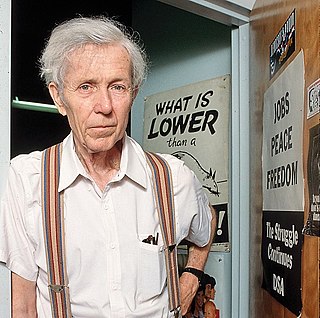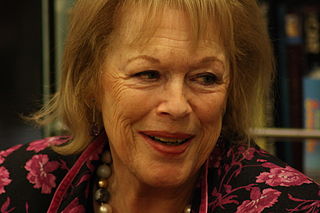A Quote by David Cooperrider
Almost without exception, everything society has considered a social advance has been prefigured first in some utopian writing.
Related Quotes
What social safety net does is provide a glimmer of hope for what a democratic socialist society might look like. It makes the claim that without social provisions, without a welfare state, without a social contract, society can't survive. We need a foundation for people - economically, politically, and socially - where what the Right considers "entitlements" are really rights.
Political philosophy is realistically utopian when it extends what are ordinarily thought to be the limits of practicable political possibility and, in so doing, reconciles us to our political and social condition. Our hope for the future of our society rests on the belief that the social world allows a reasonably just Society of Peoples.
I recall coming across a line by the late Charles Tilly when he said, "The conditions for the possibility of social movements have been called into question in the twenty-first century." And I said to myself, my god, a society in history without social movements, for me, is very difficult to live in.
Utopian fiction is really boring. I had to read a lot of it, and it's not that much fun. But they're fascinating to me as historical documents. Cabet [Icaria's founder and author of the utopian novel, Travels in Icaria], is writing in the 1830s, and his idea of the perfect society reveals a lot about his time. But his book is uniquely bad.
As to the origin of civil Societies or Governments; the Author of our Being, has given Man a Nature to be fitted for, and disposed to Society. It was not good for Man at first to be alone; his nature is social, having various Affections, Propensities and Passions, which respect Society, and cannot be indulged without a social Intercourse.
There is this fashionable progressive notion that everything is so completely political that the idea we could have some sort of neutral legal process is practically utopian - because we all know that the more money you have, the more rights you can exercise in this society. But I don't think that you deal with income inequality by limiting the First Amendment rights of affluent people. I'd rather see people screw around with the tax code to redistribute wealth a little bit than screw around with the First Amendment.
. . . [Y]ou must understand that we have always considered the writing of books a hindrance to our work, and that for this reason the custom was not to be introduced into the Company. However, since no rule, however general, does not have some exception, we shall see whether it is advisable to have yours printed.
We cannot create blueprint for future society, but it is good to think about that. It is good to have in mind a goal. It is constructive, it is helpful, it is healthy, to think about what future society might be like, because then it guides you somewhat what you are doing today, but only so long as this discussions about future society don't become obstacles to working towards this future society. Otherwise you can spend discussing this utopian possibility versus that utopian possibility, and in the mean time you are not acting in a way that would bring you closer to that.
The Oneida Perfectionists, along with some of the others, believed that feminism, and abolitionism, and other causes that they pursued in their own way without participating with other people outside of their communities, were all piecemeal reforms. That's what makes a utopian a utopian, this idea that they were going to create a whole new world from scratch.
Everyone knows history is written by the winners, but that cliche misses a crucial detail: Over time, the winners are always the progressives. Conservatism can only win in the short term, because society cannot stop evolving (and social evolution inevitably dovetails with the agenda of those who see change as an abstract positive). It might take seventy years, but it always happens eventually. Serious historians are, almost without exception, self-styled progressives. Radical views--even the awful ones--improve with age.
No general description of the mode of advance of human knowledge can be just which leaves out of account the social aspect of knowledge. That is of its very essence. What a thing society is! The workingman, with his trade union, knows that. Men and women moving in polite society understand it, still better. But Bohemians, like me, whose work is done in solitude, are apt to forget that not only is a man as a whole little better than a brute in solitude, but also that everything that bears any important meaning to him must receive its interpretation from social considerations.

































